8-9 August | 10 August | 11 August| 12 August | 13 August
13 August
The last part of Monsignor Ocáriz's visit to Bolivia took place in Santa Cruz, with two encounters with the people of the Work and other friends held right in one of the airport lounges. Because of a cancelled flight, the Prelate could not visit the centers of this city.
At lunch, Santiago told the Prelate the story of the first supernumerary from Santa Cruz: Alberto Seleme, a psychiatrist who studied at the University of Navarra and met Saint Josemaría. Seleme asked for admission to Opus Dei during one of Father Danilo's trips to Santa Cruz, before there was even a center in the country. Shortly thereafter he died of cancer. When Sutó—a new center of Opus Dei in Santa Cruz—was under construction, the streets in the area were marked with numbers. However, eventually names were assigned, and the street on which Sutó lies was called "Dr. Alberto Seleme." From that moment on, the people there prayed to him as a special intercessor to bring their initiatives forward.
During the get-together, the Prelate stressed that "apostolate means loving people." Those present asked him about family issues and social involvement, prayer and raising children. The Bolivians could not resist giving the Prelate a "camba" sombrero, along with hugs and blessings.
There was time for several questions. People were interested to know how the Prelate met Opus Dei, and the names of his parents. Other questions dealt with the meaning of suffering following the loss of a child and practicing the faith in one's family. After about 25 minutes, around 5:30, the Prelate departed in a flight headed to Asunción, in Paraguay.
In the morning, the Prelate visited several Centers and various educational and social initiatives promoted by the faithful of Opus Dei, cooperators and friends.
At 10:45, a group of girls who attend activities at the Hontanar Club were waiting for him there at this center. Pili, Susy and Ely—the team that directs the club—welcomed him and told him about the advantages of enjoying a new site for the club as of this past year. After lighting a candle and praying the Salve before a beautiful image of Our Lady, they greeted him and took a picture in the garden, along with girls from Peru and Santa Cruz de la Sierra.
Following this encounter, the Prelate paid a visit to Horizons School. In the music room, a stage had been set up to have a get-together with teachers and administrative staff. Monsignor Ocáriz reminded them of the importance of their work of formation and the human and Christian education they provide there. In responding to a question by Caro, a math teacher as well as a volunteer firefighter, the Prelate said that, through teaching math, it was possible to help others find God. Before visiting the school's chapel, which is dedicated to Saint Josemaría, he blessed two pregnant teachers.
The morning concluded with a Holy Mass for families, held at the Cumbre School. The Eucharistic concelebration was held in the school's sports center, which was specially prepared for the occasion. Several families helped out by doing the readings and prayers of the faithful, singing in the choir, and bringing up the gifts. In the homily, Monsignor Ocáriz commented on the prophet Elijah: "In our lives, there is a long way to go, with easy moments and difficult ones. In easy moments, we should thank God; and when things are difficult, let us trust in Him." Referring to the day's Gospel, he said that it was in the Eucharist that we find the strength to sanctify our ordinary lives, to "be concerned about the needs of others, in our families and at work." He ended by invoking Mary, Mediator of all graces.
He had lunch at the Huayna Club, where he also gave a brief talk to a group of boys, including some Peruvians who had been in Juli for a service project. Following this, he visited the CEFIM, a gastronomy institute that has helped women for the past 29 years to improve their employment opportunities. Part of the trip was by cable car, during which Diego, an engineer who specializes in this system of transport, told the Prelate about the functioning of the network, as he also pointed out sites in the city from their aerial view.
At the CEFIM, the Prelate spoke with the staff, teachers, students and the women who assist this project, and was shown around the facilities. Brisa told him about "La Especiería," a brand of desserts that CEFIM recently launched. While touring the building, Monsignor Ocáriz laughed with students who insisted that he try the different dishes they had prepared for the occasion: fruit wedges, juices, etc. Several students asked him to bless their hands: their "instrument" of work. With everyone, the Prelate had words of thanks and encouragement for the work being done at the Institute. In Illawa, a student residence next to the CEFIM, the residents were waiting for his visit following the tour of the school. As he made his way there, he also met briefly with the families of Lidia, Claudia and Basi, all of whom work at CEFIM.
Afterwards, Monsignor Ocáriz went to Thaki, where many families and a group of cooperators from Cochabamba were able to spend time with him. The children were thrilled with the candy the Father gave to each of them. There were photos, selfies, questions, and, of course, prayer requests for specific intentions.
The day ended with dinner at Rio Abajo as well as a final get-together, where they sang a song to Our Lady written by one of those present that describes the geography and people of the area. The Prelate thanked them for all the affectionate care he had received over the last few days.
The day was full of get-togethers with the Prelate: two in the garden of La Estancia Convention Center and one in Río Abajo, the retreat house where Monsignor Ocáriz is staying. A bright blue sky featured as the backdrop for these outdoor encounters.
In the first gathering, Monsignor Ocáriz started out by recalling the faith of Saint Josemaría, and commented on the Gospel of the day: "Faith moves mountains; nothing is impossible for those who have faith. So we should be people with great faith, and great trust in God. Trusting that God has chosen us as we are." And he added: "This also means that we should always be very happy, despite the difficulties."
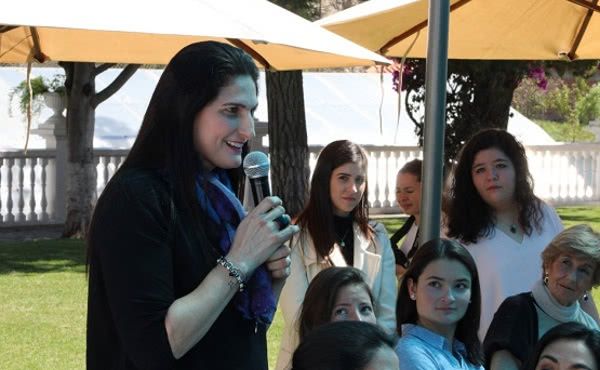
Natalia, from Santa Cruz, said that the day after she met the Work, she was already helping to find funds for various needs of the center and so she felt herself to be part of the project. Valeria, from Cochabamba, also spoke, as well as Katterine, an Olympic swimmer who lives in Santa Cruz. And then Leo, from Potosí, explained how she met the Work through a supernumerary from Mendoza (Argentina) with whom she worked.
In the afternoon, the Prelate spent time in Río Abajo amidst a relaxed atmosphere of jokes and anecdotes. At four o'clock, the get-together with students began, the setting warmed by a welcome poster: "Father! Thanks for being here!" In the garden, some of the girls danced a typical Bolivian dance, dressed in the traditional costumes of La Paz, Cochabamba, Potosí, Tarija and Chuquisaca.
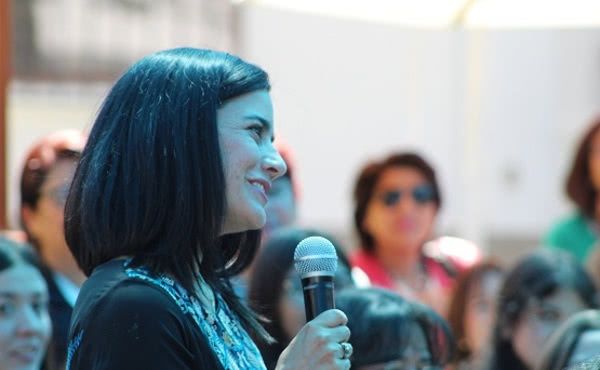
Lucia asked about how to be consistent with one's goals, and the Prelate stressed the importance of the virtue of order, especially when we need to make time to pray amid daily occupations.
Rafaela, 15, described how she had been in intensive care for several days a few months ago, and that it had brought her closer to God. She asked how each person could discover what God wants from them. Monsignor Ocáriz suggested asking, in one's prayer, for light to see and strength to want to.
The evening get-together in Rio Abajo began with a welcome from José. Speaking in Quechua, he recalled the 40 years since the beginning of the apostolic work of Opus Dei in Bolivia. On behalf of all the cooperators of the Work in the country, Carlos gave the Prelate a colonial-style Crucifix, which possibly belonged to the venerable Virginia Blanco (this is being investigated).
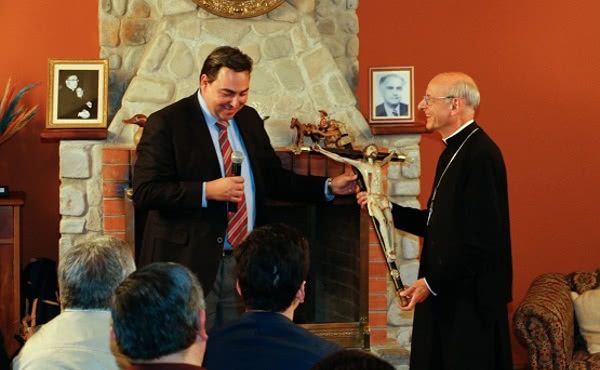
In reply to several different questions, the Prelate stressed the same answer: "For every need, the first thing is prayer." And expanding on this idea, on learning that one of those present would soon make a pilgrimage to the Holy Land, Monsignor Ocáriz insisted that "we are not following a life-scheme, but a Person," namely, Jesus. Finally, as on other occasions during this pastoral trip, he highlighted the importance of the apostolate with families for the Church. In particular, he made an appeal for "true friendship among families" to help each other along the path of Christian life.
After dinner, he thanked all those who had prepared a buffet of traditional food for the occasion.
After a morning of personal conversations, the Prelate met with a group of women in La Casita, an area of the Río Abajo conference center. They received him singing "Paint Me Bolivia", a song that describes the different geographical areas of the country.
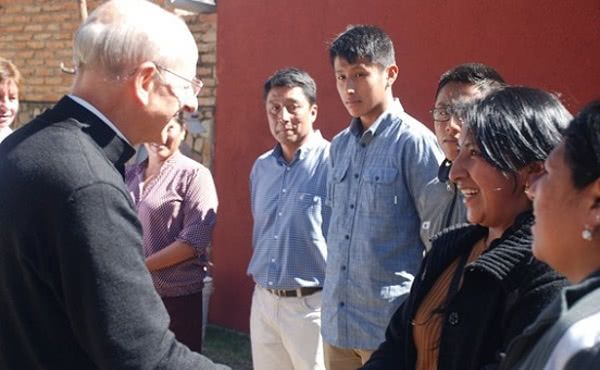
During the get-together, Lydia told the Prelate about the recent death of two brothers and the serious illness of another. Monsignor Ocáriz encouraged her to become stronger, with hope and prayer, and at the same time he asked everyone present to pray for the whole family at that moment. Carmen, a psychologist and mother of three children, told him that 21 years ago, Bishop Echevarría, the previous Prelate of Opus Dei, had blessed her baby when she was still pregnant. Now, in a new stage of her life, she is opening the doors of her house to organize classes for cooperators of the Work, in addition to catechism classes and a circulating library.
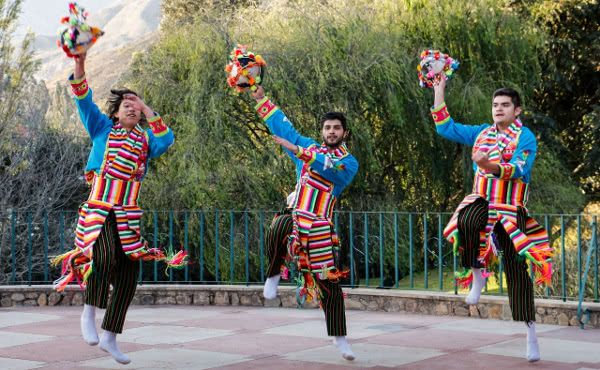
At the end of the encounter, Monsignor Ocáriz planted an acacia tree in the garden and greeted the family of Santiago and Leticia.
In the afternoon, in Rio Abajo he received the Archbishop of La Paz, Edmundo Abastoflor, and also the auxiliary bishop and secretary of the Bishops' Conference, Bishop Aurelio Pesoa, as well as and the military bishop, Bishop Fernando Bascopé. It was a very pleasant and warm meeting, during which they spoke about the challenges faced by the Church in Bolivia and in the world. At the end, they took a photograph, promised mutual prayers, and also prayed together a Hail Mary.
The Prelate also met with a group of students from La Paz, Cochabamba and Santa Cruz. Nicolás, Jorge and Joaquín danced a Tinku that, as Diego explained, is a pre-Inca warrior dance from Potosí. They received applause and a hug of thanks from the Prelate.
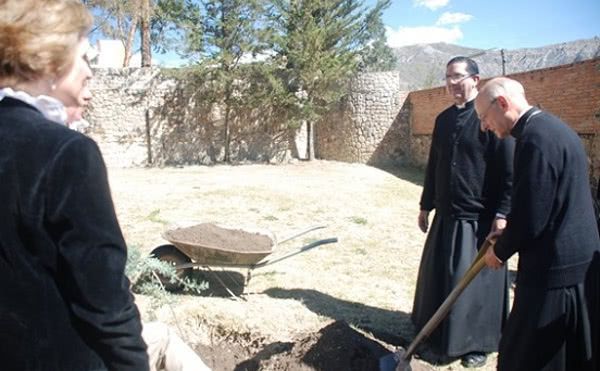
Back in the living room, they also told the Prelate anecdotes and asked several questions: regarding the relationship between science and faith, the commitment to move the country forward, sincerity with oneself about one's use of time with regard to watching movies and television series, suggestions on how to combat laziness, and generosity in helping others…
Lucas played a tango on the organ and also shared his appreciation of social networks. Nicolas asked about how to distinguish between charity and arrogance when he had to correct one of his younger brothers. The Prelate proposed a "system": joy. "If you're going to say something with anger or annoyance, there is pride there. On the other hand, if you are joyful, this is already a sign of charity. " He added: "It shouldn't be a reaction due to something that has bothered you, but always something that can really help the other person."
Responding to Juani (who had given the Prelate a traditional hat, typical of the Andean regions of Bolivia), Monsignor Ocáriz highlighted the Christian virtue of patriotism: "The country where we grow up has given us a lot, and we have a duty to correspond." Seeing the need for development in the country leads us to be generous in "being active for the common good and not only our own good. We are responsible for the whole of society, and not just our own things."
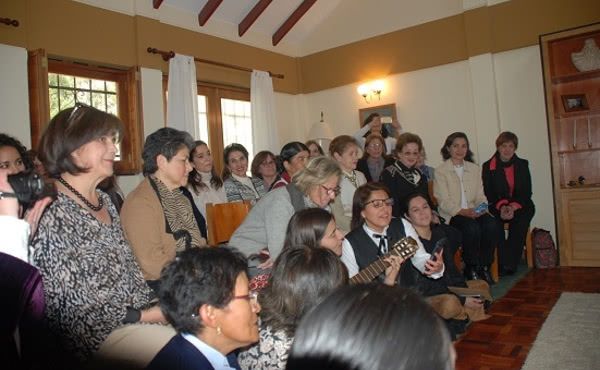
When it began to get dark, the house took on another tone as it was filling up with the 24 families who had come to greet the Prelate that night. Daniel and Carla, both with doctorates in Physics, proposed a Physics riddle to Monsignor Ocáriz, something having to do with Newton and Pascal, which relaxed the environment so that they could introduce him to their seven children.
Maria Eugenia showed the Prelate a picture of her son, Mauricio, who died at the age of 39 after falling from the roof of a church he was helping to restore.
The day concluded with a photo presentation summarizing the 40 years of apostolic work in Bolivia, which featured Father Danilo, who actually met Opus Dei in the United States, along with Father Gabriel and Alberto; they were the first three who, on June 7, 1978, landed in La Paz to begin the Work there. The slideshow also included images from the trip made by Bishop Javier Echevarría in 1997, and the Prelate was happy to recognize Nancy, the little girl who had sat next to him on the stage couch.
On Wednesday, 8 August, the Prelate set foot on Bolivian soil, arriving from Buenos Aires in the afternoon. The plane made a stop in Santa Cruz de la Sierra and, while waiting for the flight to La Paz, Monsignor Ocáriz had an opportunity to converse at the airport with a group of Opus Dei faithful who live in that city. He encouraged all those present to continue working with optimism, joy and hope. They said good bye singing the traditional song "Camba, enchanted land," which evokes the surrounding green fields, rivers, aromas, and the sweetness of ripe sugar cane.
The Prelate arrived at El Alto airport, at 4000 meters above sea level, towards the end of the day. There he greeted Father Marcelo, vicar of Opus Dei in Bolivia, as well as some other Bolivian members of the Work. The Medina family gave him a ceramic boat, typical of the country. From there, Monsignor Ocáriz traveled to Río Abajo, the retreat house where he will stay until Monday, in an area 3050 meters above seal level. Thursday was a calm day, so as to have some time to get used to the altitude.
Diego, one of those who had come to greet the Prelate, told some anecdotes about the cable car network in La Paz, the largest in the world. Sebastian spoke about a new educational project in Santa Cruz de la Sierra. Mountain excursions, anecdotes about work and family: these are the small stories that make up the day to day of the Work's activities in these lands.
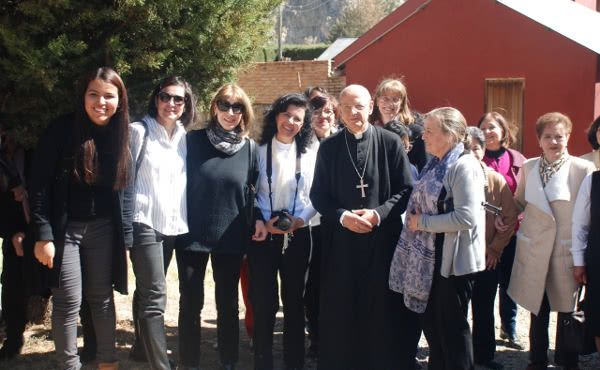
In the afternoon at Río Abajo, the Prelate met with a group of women members of the Work, from both Bolivia and Peru. They greeted him with the typical Aymara greeting, very warm and welcoming: “¡Jallalla, Father!”, which expresses a combination of hope, celebration and joy.
During the encounter, Loli gave the Prelate a huge key on behalf of the members of the Hontanar youth club, who wanted to invite him to visit their new club building that has just opened its doors. Basi told him about an event they had organized to raise funds for the oratory at Illawa, another one of the centers in La Paz, and offered the Prelate a little wooden donkey. Monsignor Ocáriz was especially grateful for the work of the people who look after the domestic services in the conference center and encouraged them all in their efforts to help people draw close to God, without worrying about the difficulties.
Another member of the Work, Alejandra, lost her husband in an accident eleven years ago when her daughter was just five days old. She told the Prelate that after receiving a big favor from Blessed Alvaro, he became her main ally in her efforts to carry out a social project for boys living on the street. Later on, they sang a song to Our Lady of Copacabana, composed by Susana, one of the first members of the Work to bring Opus Dei to Bolivia in 1979.
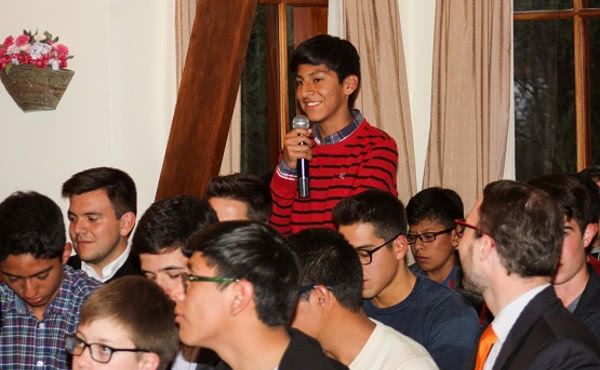
Later on in the afternoon, Monsignor Ocáriz had tea with Fernando and Clemente, both priests, and they offered him some typical products from the area of Juli: chuspa and lluchu. In the evening, Carlos gave the Prelate some donkey-shaped pins, a gift from Marcelo and Akemi, which were to be given away, after being blessed, to people who share Saint Josemaria's "theology of the donkey": hard work, day after day, that produces abundant fruit.